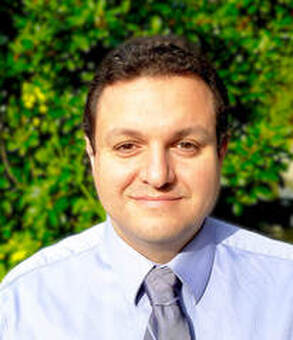Hesham Soliman

PhD: Cardiovascular Pharmacology
Master’s degree: Pharmacology
Bachelor’s degree: Pharmaceutical Sciences
Project summary
Hesham is interested in studying the role of cardiac-resident multipotent mesenchymal stromal cells (also called fibro-adipogenic progenitors; FAPs) in the formation of fibrofatty lesions that are characteristic of a disease called arrhythmogenic cardiomyopathy (AC). Arrhythmogenic cardiomyopathy is an inherited cardiac disease associated with fatal ventricular arrhythmias and sudden cardiac death. It occurs in about 1/5000 people and is characterized by progressive myocardial death associated with replacement with fibrofatty connective tissue. Mutations in the desmosomal proteins plakoglobin, desmoplakin, plakophilin-2, desmoglein-2 and desmocollin-2 are highly implicated in AC pathophysiology.
This project will involve the utilization of a combination of cell and molecular biology as well as functional cardiology techniques to highlight the role of FAPs in murine models of AC. Additionally, Hesham will investigate whether pharmacologic modulation of the proliferation and differentiation of this cell population will have important consequences on cardiac function.
Personal Summary
Following completion of his Bachelor’s degree in Pharmaceutical Sciences at Alexandria University in Egypt, Hesham pursued graduate studies in the field of pharmacology. In his Master’s thesis, he studied drug classes that possess novel mechanisms of anti-ulcer and cytoprotective activity. Following his passion for biomedical research, Hesham traveled to Vancouver, Canada to join the PhD program of the Faculty of Pharmaceutical Sciences at the University of British Columbia where he investigated the role of the RhoA-Rho kinase (ROCK) pathway in diabetic cardiomyopathy. Afterwards, in his first postdoctoral fellowship, Hesham continued to work on ROCK and showed that over-activation of ROCK2 is implicated in obesity-induced whole body insulin resistance and cardiac dysfunction. In January 2015, Hesham joined the Rossi lab at the University of British Columbia as a postdoctoral research fellow, still with a focus on the heart, but from a very different perspective. Hesham has been the recipient of a number of merit-based awards and scholarships, including the Canadian Diabetes Association doctoral fellowship.
Selected Publications
Rossi FM (2020). Pathogenic potential of Hic-1 expressing cardiac stromal progenitors. Cell Stem
Cell; S1934-5909(19)30526-0.
doi:10.1016/j.matbio.2020.05.003
doi:10.1016/j.ijcard.2019.10.017.
ahead of print, 2020 May 20]. Journal of Cell Science; 2020;jcs.242297. doi:10.1242/jcs.242297.
Zaph C, Rando TA, Rossi FM (2018). Inhibition of methyltransferase Setd7 allows the in vitro
expansion of myogenic stem cells with improved therapeutic potential. Cell Stem Cell; Feb
1;22(2):177-190.
diets. J Biol Chem; 18; 290(38):23371-84
Master’s degree: Pharmacology
Bachelor’s degree: Pharmaceutical Sciences
Project summary
Hesham is interested in studying the role of cardiac-resident multipotent mesenchymal stromal cells (also called fibro-adipogenic progenitors; FAPs) in the formation of fibrofatty lesions that are characteristic of a disease called arrhythmogenic cardiomyopathy (AC). Arrhythmogenic cardiomyopathy is an inherited cardiac disease associated with fatal ventricular arrhythmias and sudden cardiac death. It occurs in about 1/5000 people and is characterized by progressive myocardial death associated with replacement with fibrofatty connective tissue. Mutations in the desmosomal proteins plakoglobin, desmoplakin, plakophilin-2, desmoglein-2 and desmocollin-2 are highly implicated in AC pathophysiology.
This project will involve the utilization of a combination of cell and molecular biology as well as functional cardiology techniques to highlight the role of FAPs in murine models of AC. Additionally, Hesham will investigate whether pharmacologic modulation of the proliferation and differentiation of this cell population will have important consequences on cardiac function.
Personal Summary
Following completion of his Bachelor’s degree in Pharmaceutical Sciences at Alexandria University in Egypt, Hesham pursued graduate studies in the field of pharmacology. In his Master’s thesis, he studied drug classes that possess novel mechanisms of anti-ulcer and cytoprotective activity. Following his passion for biomedical research, Hesham traveled to Vancouver, Canada to join the PhD program of the Faculty of Pharmaceutical Sciences at the University of British Columbia where he investigated the role of the RhoA-Rho kinase (ROCK) pathway in diabetic cardiomyopathy. Afterwards, in his first postdoctoral fellowship, Hesham continued to work on ROCK and showed that over-activation of ROCK2 is implicated in obesity-induced whole body insulin resistance and cardiac dysfunction. In January 2015, Hesham joined the Rossi lab at the University of British Columbia as a postdoctoral research fellow, still with a focus on the heart, but from a very different perspective. Hesham has been the recipient of a number of merit-based awards and scholarships, including the Canadian Diabetes Association doctoral fellowship.
Selected Publications
- Soliman H, Paylor B, Scott RW, Lemos D, Zhang CK, Arostegui M, Low M, Lee C, Fiore D,
Rossi FM (2020). Pathogenic potential of Hic-1 expressing cardiac stromal progenitors. Cell Stem
Cell; S1934-5909(19)30526-0.
- Soliman H, Rossi FMV (2020). Cardiac fibroblast diversity in health and disease [published online
doi:10.1016/j.matbio.2020.05.003
- Soliman H, Nyamandi V, Hove-Madsen L and MacLeod KM (2020). ROCK2 as a novel target for
doi:10.1016/j.ijcard.2019.10.017.
- Contreras O, Soliman H, Theret M, Rossi FM, Brandan E (2020). TGF-β-driven downregulation of
ahead of print, 2020 May 20]. Journal of Cell Science; 2020;jcs.242297. doi:10.1242/jcs.242297.
- Judson RN, Quarta M, Oudhoff M, Soliman H, Chang CK, Yi L, Lou G, Hamer M, Blonigan J, He
Zaph C, Rando TA, Rossi FM (2018). Inhibition of methyltransferase Setd7 allows the in vitro
expansion of myogenic stem cells with improved therapeutic potential. Cell Stem Cell; Feb
1;22(2):177-190.
- Beam J, Botta A, Ye J, Soliman H, Matier BJ, Forrest M, Macleod KM and Ghosh S (2015).
diets. J Biol Chem; 18; 290(38):23371-84
- Soliman H, Gador A, Lu YH, Lin G, Bankar G, MacLeod KM (2012). Diabetes-induced increased oxidative stress in cardiomyocytes is sustained by a positive feedback loop involving Rho kinase and PKCbeta2. Am J Physiol Heart Circ Physiol; 303(8): H989-H1000.
- Nagareddy, P R, Soliman, H, Lin, G R, Rajput, P S, Kumar, U, McNeill, J H, and MacLeod, K M (2009). Selective Inhibition of Protein Kinase C beta(2) Attenuates Inducible Nitric Oxide Synthase-Mediated Cardiovascular Abnormalities in Streptozotocin-Induced Diabetic Rats, Diabetes; 58, 2355-2364.

